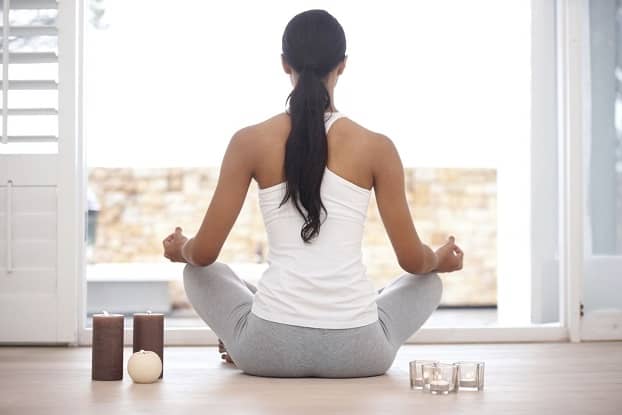There is a deep connection between sleep and meditation. As we all know, meditation helps improve sleep quality and relaxes our body. It not only helps enhance the quality of sleep but also helps in physiological changes in the body such as lowered heart rate, reduced blood pressure, and the release of neurotransmitters that promote relaxation.
Connection between sleep and meditation
Meditation promotes the deep quality of sleep. Meditation reduces the stress hormones and quite a racing mind that makes us fall asleep faster. Mediation helps unlock this positive loop and experience the benefits of both deeper sleep and a sharper mind. However, meditation for a peaceful mind and deep sleep has been practised since the ancient period.
Here are some points of how meditation helps you to promote good quality sleep,
- Reduce Stress: Both sleep and meditation play vital roles in stress reduction. Stress usually disrupts our sleep patterns which can lead to insomnia or poor sleep quality. When you practice meditation, it helps to relax your body and mind which helps to promote sleep quality.
- Active brain: At the time of meditation, the work of our brains shifts from its waking beta waves to slower alpha, theta, and delta waves, similar to those experienced during sleep. So, this transition helps us the good quality sleep.
- Mindfulness: There are various types of Meditation, but mindfulness is one of the great practices for beginners. When you become more mindful, it may help to develop greater awareness of your sleep patterns, sensations, and habits, leading to improved sleep hygiene and a better understanding of your sleep needs.
- Cognitive Benefits: Both meditation and sleep are interrelated with cognitive benefits, such as improved attention, memory, and emotional regulation. When you promote mental relaxation with meditation it may indirectly contribute to better sleep
- Helps in Sleep Disorders: Meditation helps in sleep disorders such as insomnia, sleep apnea, and restless leg syndrome. Mindfulness meditation can help to contribute to sleep disturbances, such as anxiety and rumination.
- Daily Night Routines: You can practice regular meditation at night which helps to regulate sleep-wake cycles and promote consistency in bedtime routines. Daily night routines signal to the body that it’s time to wind down and prepare for sleep, leading to more restful nights.
Types of meditation
Well, several types of meditation help us to promote the deep sleep. Besides here are some of the meditations that you can practice for your sleep quality.
Mindfulness Meditation:
Mindfulness meditation which focuses on the breath, bodily sensations, thoughts, or emotions. This meditation helps to develop clarity, emotional balance, and stress reduction. If you practice mindful meditation, it can be helpful to promote deep-quality sleep and also cultivate a sense of calm and peace of mind. Also, this meditation helps to reduce the signs of insomnia.

Focused Meditation:
This is another type of meditation that involves directing your attention to a single point of focus, like your breath, a mantra (a repeated word or phrase), or a candle flame. This practice is quite normal these days, similarly which helps to grab your attention and improve your concentration.

Mantra Meditation:
As we can see many aged groups of people do this mantra meditation, in this meditation you do is you silently repeat a mantra, a word or a phrase that has personal meaning to you. Where it sounds like a Sanskrit word or a short phrase. This mantra meditation helps to quiet the mind and promote a state of relaxation.

Movement Meditation:
While many people think that meditation only comes from sitting still which is not true, movement meditation is also a kind of meditation that incorporates physical movement into the practice. Some of the examples of Movement meditations are tai chi, yoga, and walking meditation. This meditation not only helps in staying calm, but this helps release tension improve body awareness and promote a sense of mindfulness.

Visualization Meditation:
This is another type of meditation that involves creating mental images of a peaceful place or experience. This meditation helps to reduce stress, improve mood, and promote relaxation.

Medium)
Transcendental Meditation (TM):
Transcendental Meditation (TM) is another type of meditation that repeats a mantra word, sound or phrase—silently to oneself. This mantra is effective for reducing stress, and anxiety, and improving blood pressure.

However, this meditation is helpful for you to promote good quality of sleep. Out of this six meditation explain this article you can try any of one.
How to do meditation for deep sleep?
Here are the simple meditation tips that you can follow to promote good quality of sleep,
- Find a Comfortable Position and Place: Before starting a meditation, you need to find a comfortable place and sit or lie down in a comfortable position. You can sit in any way which you feel comfortable where you can sit cross-legged on a cushion, lie down on your back in bed, or even you can do in a comfortable chair.
- Focus on Your Breath: After you find a comfortable place and position you need to close your eyes and focus on your breath. You need to focus on the sensation of each inhale and exhale.
- Deep Breathing: For effective yoga you need to focus on the deep breathing of slowly breathing, deep breaths, inhaling deeply through your nose and exhaling slowly through your mouth. While you exhale the breath you need to feel the breath fill your lungs and then release any tension. For an effective result, you need to Continue this process for several times.
- Muscle Relaxation: While doing meditation you need to feel relaxed starting from your toes and working your way up to your head. Muscle relaxation is the most important part of meditation it can also help to promote deep sleep.
- Body Scan: After doing deep breaths and muscle relaxation part what you have to do is do a mental scan of your body from head to toe. Once you’ve done the body scan you need to release the tension and allow the body to sink deeper into relaxation.
- Visualization: Visualization is also an important part of meditation, imagine yourself in a peaceful and tranquil environment, such as a beach, forest, or meadow which helps you to get positivity and feel tension-free.
- Mindful Awareness: When this all is done bring your attention back to your breath and continue to focus on the sensation of each inhale and exhale.
- Gratitude Practice: At the last of your meditation, say three things that you were grateful for from your day.
- End with Affirmations: After finishing your meditation e affirmation or mantra related to sleep and relaxation.
- Transition to Bed: When you feel you relax your body and mind it’s time to rest your body. So, feel ready, slowly transition to your bed and continue to maintain a sense of relaxation.
FAQs
1. What is the connection between sleep and meditation?
Meditation promotes the deep quality of sleep. Meditation reduces the stress hormones and quite a racing mind which makes us fall asleep faster. Mediation helps to unlock this positive loop and experience the benefits of both deeper sleep and a sharper mind. However, meditation for a peaceful mind and deep sleep has been practised since the ancient period
2. What are the types of meditation?
The types of meditation are Mindfulness Meditation, Focused Meditation, Mantra Meditation, Movement Meditation, Visualization Meditation, and Transcendental Meditation (TM).
3. How does Mindfulness Meditation help to promote quality sleep?
Mindfulness meditation which focuses on the breath, bodily sensations, thoughts, or emotions. This meditation helps to develop clarity, emotional balance, and stress reduction. If you practice mindful meditation, it can be helpful to promote deep-quality sleep and also cultivate a sense of calm and peace of mind. Also, this meditation helps to reduce the signs of insomnia.
4. How does Movement Meditation help to promote quality sleep?
While many people think that meditation only comes from sitting still which is not true, movement meditation is that which incorporates physical movement into the practice. Some of the examples of Movement meditations are tai chi, yoga, and walking meditation. This meditation not only helps in staying calm, but this helps release tension improve body awareness and promote a sense of mindfulness.
Also, read more about, “Yoga for Better Sleep: Poses and Practices to Enhance Relaxation”
